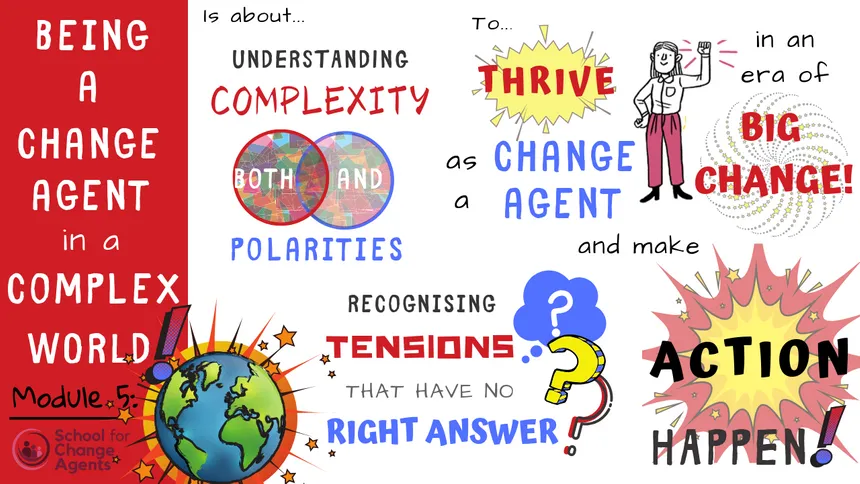Being a Change Agent in a Complex World – Reflections on Module 5 of The School for Change Agents

Originally published by Leigh Kendall – 3rd July 2019
During the fifth School for Change Agents webinar, Helen Bevan talked about her enjoyment of dystopian science fiction novels. That resonated with me, because I’m a fan of the genre too. The plots of those novels tend to focus on death and destruction, pain and suffering. The future world of those books looks like a dark place indeed.
It’s not all doom and gloom, though.
What does the future hold? None of us can know, with any certainty. What we do know though is that we live in a world full of complexity, and as Helen and Kathryn Perera described during the webinar there’s lots we can do to prepare ourselves.
What does living in a world of complexity mean?
I specialise in language and communication, and so was especially interested in Helen’s points about creating conversations that match the issue we’re trying to address. The example Helen used is a really useful way of looking at it:
- Simple: when baking a cake, as long as you follow the recipe and method you’re highly likely to get the same results every time
- Complicated: sending a rocket to the moon is a huge undertaking, but as long as you follow formulas and scientific processes success is nearly guaranteed
- Complex: when you’re raising a child there’s myriad advice and guidance. As every child is different, and there are no end of outside influences and variables, there’s no one ‘recipe for success’.
In short, complexity is…complex. It’s about living with uncertainty; that the world is full of both/ands rather than either/or; shades of grey rather than black and white.
That means as change agents and as leaders, we need to demonstrate a high level of maturity in dealing creatively with increasing complexity, uncertainty, diversity, and numbers of paradoxes.
Kathryn explored the various mindsets we can have as humans, and through our lives. This model is based on the work of Professor Robert Kegan, and Dr Jennifer Garvey Berger.
When we are children, we tend to be ego-centric, with a loose logic that allows for acceptance of magic. As we become adolescents, our world view and perspective changes – we tend to view the world in black and white, and prefer the comfort of the known to the unknown.
Most adults operate in a ‘socialised mindset’, with a reliance on the views and norms of others to determine what is right and wrong. In this mindset, we have more capacity to understand the role of uncertainty in life, though still feel discomfort with the unknown.
Some adults have a ‘self-authoring’ mind. Benefits of this mindset include the development of their own moral compass, while downsides include resisting evidence that their beliefs are wrong.
The ideal for a change agent in a complex world is the ‘self-transforming mindset’, which includes:
- Openness to new ideas and perspectives – even those that actively challenge their own;
- Ease with complexity, ambiguity and change;
- A resistance to simple answers in complex situations;
- Comfortable with chaos and paradox.
This overview to me felt uplifting: in a future that is uncertain for us all, what we can have control over is our own mindset. By cultivating a mindset that is comfortable with complexity, ambiguity, and change we can be confident that we are able to face the future with optimism.
If you missed the webinar, you can catch up with the recording and view the School for Change Agents Module 5 Slidedeck.
Further reading:
Unlocking Leadership Mindtraps (2019)
An Everyone Culture: Deliberately Developmental Organisations (2016)
Changing on the Job: Developing Leaders for a Complex World (2013)
In Over Our Heads (1995)
TWEETS ON THIS SUBJECT
